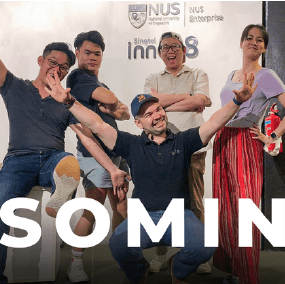Nowadays, social networks play a crucial role in human everyday life and no longer purely associated with spare time spending. In fact, instant communication with friends and colleagues has become an essential component of our daily interaction giving a raise of multiple new social network types emergence. By participating in such networks, individuals generate a multitude of data points that describe their activities from different perspectives and, for example, can be further used for applications such as personalized recommendation or user profiling. However, the impact of the different social media networks on machine learning model performance has not been studied comprehensively yet. Particularly, the literature on modeling multi-modal data from multiple social networks is relatively sparse, which had inspired us to take a deeper dive into the topic in this preliminary study. Specifically, in this work, we will study the performance of different machine learning models when being learned on multi-modal data from different social networks. Our initial experimental results reveal that social network choice impacts the performance and the proper selection of data source is crucial.
Wellness is a widely popular concept that is commonly applied to fitness and self-help products or services. Inference of personal wellness-related attributes, such as Body Mass Index (BMI) category or diseases tendency, as well as understanding of global dependencies between wellness attributes and users’ behavior is of crucial importance to various applications in personal and public wellness domains. At the same time, the emergence of social media platforms and wearable sensors makes it feasible to perform wellness profiling for users from multiple perspectives. However, research efforts on wellness profiling and integration of social media and sensor data are relatively sparse, and this study represents one of the first attempts in this direction. Specifically, we infer personal wellness attributes by utilizing our proposed multi-source multitask wellness profile learning framework — “WellMTL”, which can handle data incompleteness and perform wellness attributes inference from sensor and social media data simultaneously. To gain insights into the data at a global level, we also examine correlations between first-order data representations and personal wellness attributes. Our experimental results show that the integration of sensor data and multiple social media sources can substantially boost the performance of individual wellness profiling.
Venue category recommendation is an essential application for the tourism and advertisement industries, wherein it may suggest attractive localities within close proximity to users’ current location. Considering that many adults use more than three social networks simultaneously, it is reasonable to leverage on this rapidly growing multi-source social media data to boost venue recommendation performance. Another approach to achieve higher recommendation results is to utilize group knowledge, which is able to diversify recommendation output. Taking into account these two aspects, we introduce a novel cross-network collaborative recommendation framework C 3R, which utilizes both individual and group knowledge, while being trained on data from multiple social media sources. Group knowledge is derived based on new crosssource user community detection approach, which utilizes both inter-source relationship and the ability of sources to complement each other. To fully utilize multi-source multi-view data, we process user-generated content by employing state-of-the-art text, image, and location processing techniques. Our experimental results demonstrate the superiority of our multi-source framework over state-of-the-art baselines and different data source combinations. In addition, we suggest a new approach for automatic construction of inter-network relationship graph based on the data, which eliminates the necessity of having pre-defined domain knowledge
Press About Us

A digital twin is precisely what its name suggests: A digital copy of a physical object or system—even a human being. It may be a simple concept, but the potential applications are anything but. Through the ongoing collection and exchange of data, a digital twin can simulate and even predict the behaviors and reactions of its physical twin in a variety of conditions, providing invaluable insights to industries ranging from manufacturing to healthcare.
Digital twin technology allows businesses and organizations to test products and processes, study and predict how real-world conditions can affect physical objects and beings, and make well-informed, big-impact decisions with minimized financial and human safety risks. Below, 16 members of Forbes Technology Council share some of the fascinating ways industries and organizations are leveraging digital twin technology.

Anyone with an eye on the business world knows that tech professionals across industries saw their roles and responsibilities take a huge leap forward with the onset of widespread remote and hybrid work in the wake of the Covid pandemic. Even before that, tech leaders and their teams—both those working for tech-focused companies and those in other industries—had already been having an increasingly large impact on the ways their companies operated.
And while changing workplaces and markets are adding new challenges, there are also “evergreen,” ongoing issues that tech leaders will likely always need to wrestle with, even as they help fellow leaders learn to lean on the unique perspective a tech expert can bring to overall business strategy. Below, 16 members of Forbes Technology Council share the new (and ever-present) priorities they’re dealing with and why they’re so important.

A look inside Investible's backing of SoMin.ai, a startup revolutionising the digital marketing industry.
Earlier this year, Investible backed Singapore-based SoMin.ai, a deep-tech marketing technology that leverages machine learning to give marketers a better return on their advertising spend investment. The business is led by co-founders Aleksandr Farseev (CEO) and Kirill Lepikhin (CTO), a technical and incredibly savvy duo intimately familiar with the sector they have begun to disrupt.
Traditional marketing approaches are not cost-efficient. It can be difficult for marketers to correlate the money spent on a marketing campaign with revenue from sales (i.e. return on marketing spend). Currently, one way to measure and test advertising campaigns is iterative A/B testing through focus groups. With the introduction of machine learning and natural language processing, there are now ways to derive insights that reflect the wider market and not just select sample sizes. Big data algorithms now have the capability to scrape data from user-generated content (e.g. what consumers have liked on Instagram) and use it to create an intimate understanding of consumer behaviour.
